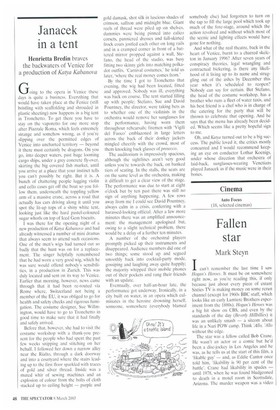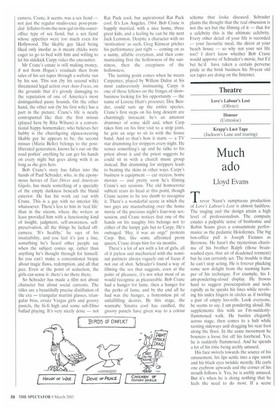Fallen star
Mark Steyn
Ican't remember the last time I saw Hogan's Heroes. It must be on somewhere right now, as you're reading this, if only because just about every piece of extant Sixties TV is making money on some rerun channel (except for 1960s BBC stuff, which looks like an early Lumiere Brothers experiment from the 1880s). Hogan's Heroes was a big hit show on CBS, and even by the standards of the day (Beverly Hillbillies) it was an unlikely smash — a sitcom about life in a Nazi POW camp. Think 'Allo, 'Allo without the edge.
The star was a fellow called Bob Crane. He wasn't an actor or a comic but he'd been a disc-jockey in Los Angeles and he was, as he tells us at the start of this film, a 'likable guy' — and, as Eddie Cantor once told him, 'likability is 90 per cent of the battle'. Crane had likability in spades — until 1978, when he was found bludgeoned to death in a motel room in Scottsdale, Arizona. The murder weapon was a video camera. Crane, it seems, was a sex fiend — not just the regular studio-exec post-prandial fellatio-from-the-new-gal-in-the-outeroffice type of sex fiend, but a sex fiend whose appetites were too much even for Hollywood. The likable guy liked being liked only insofar as it meant chicks were eager to go to bed with him and willing to let his sidekick Carpy video the encounter.
Mr Crane's estate is still making money, if not from Hogan's residuals then from sales of his sex tapes through a website run by his son, This son (by his second wife) threatened legal action over Auto Focus, on the grounds that it's grossly damaging to the reputation of one of America's most distinguished pussy hounds. On the other hand, the other son (by his first wife) has a part in the picture. Crane's life is neatly contrapuntal like that: the first missus (played here by Rita Wilson) is a conventional happy homemaker, who believes her hubby is the churchgoing alpaca-wearing likable guy he appears to be: the second missus (Maria Bello) belongs to the postliberated generation, knows he's out on the road porkin' anything he can get his hands on every night but goes along with it as long as she gets hers.
Bob Crane's story has fallen into the hands of Paul Schrader, who, in the eponymous heroes of Taxi Driver and American Gigolo, has made something of a specialty of the empty darkness beneath the bland exterior. He has his work cut out with Crane. This is a guy with no interior life whatsoever. There's less to him in 'real life' than in the sitcom, where the writers at least provided him with a functioning kind of insight, judgment, self-awareness, selfpreservation, all the things he lacked offcamera. 'It's healthy,' he says of his insatiability, and you feel it's just a line, something he's heard other people say when the subject comes up, rather than anything he's thought through for himself. So you can't make a conventional biopic about tragic flaws, redemption, and all that jazz. Even at the point of seduction, the girls can sense it: there's no there there,
So Schrader has made a film not about character but about social currents, The titles are a beautifully precise distillation of the era — triangular martini glasses, triangular bras, ersatz Vargas girls and groovy pastels, the hi-fi high and some sub-Dino ballad playing. It's very nicely done — not
Rat Pack cool, but aspirational Rat Pack cool. It's Los Angeles, 1964: Bob Crane is happily married, with a nice home, three great kids, and a feeling he can be the next Jack Lenamon. Despite a character with no 'motivation' as such, Greg Kinnear pitches his performance just right — coming on as a sunny, affable everyman, and then communicating first the hollowness of the sunniness, then the creepiness of the hollowness.
The turning point comes when he meets Carpenter, played by Willem Dafoe at his most cadaverously insinuating. Carpy is one of those fellows on the fringes of showbusiness looking for his opportunity — the name of Lorenz Hart's procurer, Doc Bender, could sum up the entire species. Crane's first steps on his long descent are charmingly innocent: he's an amateur drummer of some skill and, when Carp takes him on his first visit to a strip joint, he gets an urge to sit in with the house band. And so that's how it starts — a TV star drumming for strippers every night. He senses something's up and he talks to his priest about it and the priest suggests he could sit in with a church music group instead. But drumming for strippers leads to beating the skins in other ways. Carpy's business is equipment — car stereos, home movies — and pretty soon he's filming Crane's sex sessions. The old homoerotic subtext rears its head at this point, though Crane seems to be too dumb to recognise it. There's a wonderful scene in which the two guys are masturbating over the home movie of the previous night's four-way sexsession, and Crane notices that one of the hands on his naughty bits belongs not to either of the lumpy gals but to Carpy. He's outraged. 'Hey, it was an orgy!' protests Carp. But, like some affronted prom queen. Crane drops him for six months.
There's a lot of sex with a lot of girls, all of it joyless and mechanical with the nominal partners always vaguely out of focus if not out of shot. Schrader's found a way of filming the sex that suggests, even at the point of pleasure, it's not what most of us would recognise as pleasurable. Bob Crane had a hunger for fame, then a hunger for the perks of fame, and by the end all he had was the hunger, a bottomless pit of unfulfilling desires. By this stage, the wannabe Sinatra cool has curdled, the groovy pastels have given way to a colour scheme that looks diseased. Schrader plants the thought that the real obsession is not the sex but the filming of it — that for a celebrity this is the ultimate celebrity. Every other detail of your life is recorded — your favourite meal, the decor at your beach house — so why not your sex life too? I don't know whether Bob Crane would approve of Schrader's movie, but I'd bet he'd have taken a certain perverse pride in the brisk business his 30-year old sex tapes are doing on the Internet.



































































 Previous page
Previous page